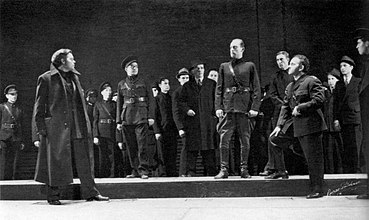


Et tu, Brute? (pronounced [ɛt ˈtuː ˈbruːtɛ]) is a Latin phrase literally meaning "and you, Brutus?" or "also you, Brutus?", often translated as "You as well, Brutus?", "You too, Brutus?", or "Even you, Brutus?". The quote appears in Act 3 Scene 1 of William Shakespeare's play Julius Caesar,[1] where it is spoken by the Roman dictator Julius Caesar, at the moment of his assassination, to his friend Marcus Junius Brutus, upon recognizing him as one of the assassins. Contrary to popular belief, the words are not Caesar's last in the play, as he says "Then fall, Caesar" right after.[2] The first known occurrences of the phrase are said to be in two earlier Elizabethan plays: Henry VI, Part 3 by Shakespeare, and an even earlier play, Caesar Interfectus, by Richard Edes.[3] The phrase is often used apart from the plays to signify an unexpected betrayal by a friend.
There is no evidence that the historical Caesar spoke these words.[4][5] Though the historical Caesar's last words are not known with certainty, the Roman historian Suetonius, a century and a half after the incident, claims Caesar said nothing as he died, but that others reported that Caesar's last words were the Greek phrase Kaì sý, téknon (Καὶ σύ, τέκνον),[6][7] which means "You too, child" or "You too, young man"[8] to Brutus.
- ^ "No Fear Shakespeare: Julius Caesar: Act 3 Scene 1 Page 5 | SparkNotes". www.sparknotes.com. Retrieved 2020-07-21.
- ^ "Et tu, Brute?". The Guardian. Guardian News and Media Limited. Retrieved 25 January 2019.
- ^ Henderson, John (1998). Fighting for Rome: Poets and Caesars, History, and Civil War. Cambridge University Press. ISBN 0-521-58026-9.
- ^ Henle, Robert J., S.J. Henle Latin Year 1 Chicago: Loyola Press 1945
- ^ Shakespeare, William (1960). S.F. Johnson; Alfred Harbage (eds.). Julius Caesar. Penguin Books. p. 74.
- ^ ...uno modo ad primum ictum gemitu sine voce edito; etsi tradiderunt quidam Marco Bruto irruenti dixisse "καὶ σύ, τέκνον". De Vita Caesarum, Liber I, Divus Iulius, LXXXII.
- ^ Suetonius, The Lives of Twelve Caesars, Life of Julius Caesar 82.2
- ^ Billows, Richard A. (2009). Julius Caesar: The Colossus of Rome. London: Routledge. pp. 249–250. ISBN 978-0-415-33314-6.